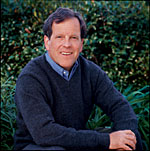sierraclub.org - sierra magazine - january/february 2009 - create: change is coming


Create | The Politics of Tomorrow
President Barack Obama can usher in our new energy future
By Carl Pope
 In mid-November, after his historic win but maddeningly far from his inauguration, President-elect Barack Obama committed the nation to reducing carbon dioxide emissions by 80 percent by 2050. In a surprise video address to a bipartisan governors' climate summit in Los Angeles, he also strongly signaled that his administration would move quickly to "help lead the world toward a new era of global cooperation on climate change."
In mid-November, after his historic win but maddeningly far from his inauguration, President-elect Barack Obama committed the nation to reducing carbon dioxide emissions by 80 percent by 2050. In a surprise video address to a bipartisan governors' climate summit in Los Angeles, he also strongly signaled that his administration would move quickly to "help lead the world toward a new era of global cooperation on climate change."
I've been executive director of the Sierra Club for 16 years: eight under Bill Clinton, eight under George W. Bush. Clinton was elected as, and served as, an incrementalist president. Bush ran as a minimalist but governed as an overreaching, hard-line reactionary and ended his second term with the worst public-approval ratings ever measured.
In the past eight years, we have grown used to hearing and saying no. What Obama is saying to us now is yes.
A new era begins January 20. Obama was elected in a genuinely transformational moment--for the nation, which faces its greatest crisis since Pearl Harbor, but also for me personally. Representative John Lewis (D-Ga.), who spoke so eloquently to the country on election night, gave me my first adult job, as a summer field organizer for the Student Nonviolent Coordinating Committee. I am not the only one who feels like the Civil War is finally over.
Far from concluded, however, is the battle between our industrial past and sustainable future, between fossil fuels and green energy. That struggle is likely to dominate Obama's presidency, as it did the presidential contest. Obama campaigned for renewables and green-collar jobs, while Senator John McCain (R-Ariz.) caved in to the "drill, baby, drill" wing of his party. On November 4, 2008, that desperate vision lost out to a "new energy for America."
With the election over, the skirmish quickly shifted to new ground. Within 24 hours of Obama's victory, diehards of the carbon economy were insisting that the president-elect should delay plans to deal with global warming and green energy because of economic woes and the deficit.
In his pre-Thanksgiving speech, Obama forcefully rejected that position. "Now is the time to confront this challenge once and for all," he said. "Delay is no longer an option."
In addition to his commitment to a federal "cap and trade" system to drastically reduce greenhouse-gas emissions, Obama can do much more to show he is serious about creating a new energy future. He can reverse Bush's worst executive actions by committing to treat carbon dioxide as an air pollutant under the Clean Air Act and letting California insist on cars that cut global-warming pollution. He can also use his executive authority to countermand Bush's last-minute anti-environmental regulations, which are already beginning to pile up.
In this time of financial crisis, Obama showed he was well aware that building a new energy future does not mean ignoring the economy. Investing $15 billion a year in clean energy, he said, will "help us transform our industries and steer our country out of this economic crisis by generating 5 million new green jobs that pay well and can't be outsourced." Retrofitting public and private buildings, beefing up mass transit, and modernizing our antiquated electrical grid should also be part of any economic-recovery package. Moreover, they will pay for themselves in the years to come.
It remains to be seen what support this effort will receive from the remnants of the Republican Party in Congress. Even if Obama cannot find partners across the aisle in Washington, he can work with the mainstream GOP, whose power base is now in statehouses from Florida to California. More than half the states have adopted their own renewable energy mandates, so the time for federal action has come. The key to Obama's success as a transformational president will be in winning over Congress--and the nation--to his vision of a new sustainable economy.
I am hopeful. I've spent much of my career telling people that the change we need was going to happen tomorrow. Now, it seems, tomorrow has arrived.
Carl Pope is the executive director of the Sierra Club. E-mail carl.pope@sierraclub.org.
Photo by Lori Eanes; used with permission.